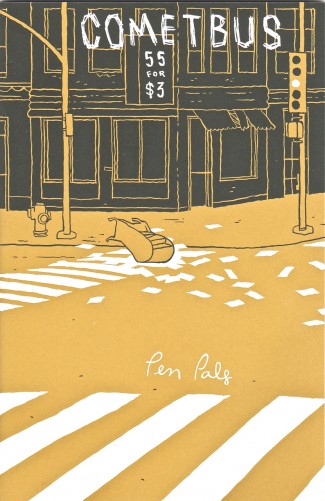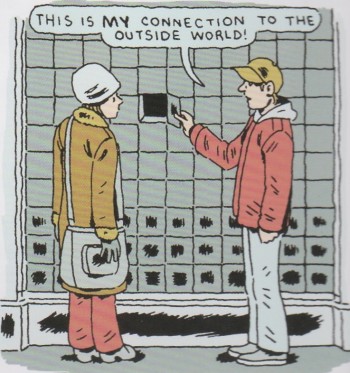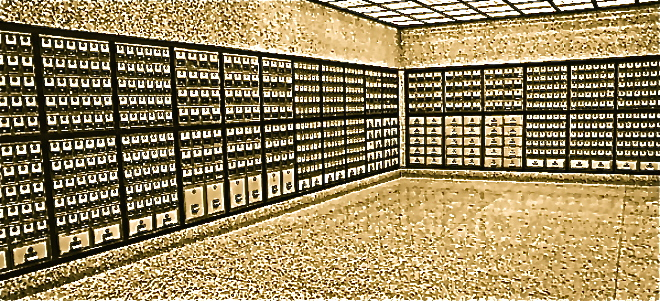Aaron Cometbus: Pen Pals
Home is where the heart is, at least as long as you can pay the rent. But I always preferred a loose paraphrase of the Robert Frost definition: it’s the place where, when you go there, they have to let you in.
Discovering and defining that place has been a central theme of Aaron Cometbus’s writing for at least as long as I’ve known him, which is a couple years longer than the 25 years spanned by his latest—and possibly greatest—work, Pen Pals, aka Cometbus 55.
That might not be how some of his longtime readers see it. Aaron has been—occasionally to his chagrin, and largely because of a handful of pieces he wrote in the long-ago 1990s—variously pigeonholed as a dumpster-diving ragamuffin or a lonesome drifter who turns up unpredictably in one obscure town or another, hangs about at the local coffee shop and/or copy shop, then departs with a notebook full of memories and observations that may or may not turn into the next Cometbus.
 There might once have been some substance to that image; perhaps a little bit of it remains. But as he pointed out in a 2001 interview, “I like to live places for a few months at a time. To other people that sounds like traveling. I understand that. But when I live places, I live there.”
There might once have been some substance to that image; perhaps a little bit of it remains. But as he pointed out in a 2001 interview, “I like to live places for a few months at a time. To other people that sounds like traveling. I understand that. But when I live places, I live there.”
I’ll admit to once having been one of those “other people.” During my years in Berkeley, the city where Aaron grew up, and with which he’s still associated in many people’s minds, I used to think of him like the tide, rolling out of town one season, rolling back a season or three later. At the time many of us were still in love with Berkeley and the East Bay, still saw it as the center of the punk rock universe. It was hard to picture where else Aaron might be going or why.
I was shocked when, around the time of the first—only—Crimpshrine tour, Aaron confided in me that he’d long dreamed of getting out of Berkeley, and had merely been waiting for the opportunity to do so. In those heady days, when Gilman Street was new and the East Bay “scene” and “sound” were still taking shape—our little community felt like the ultimate destination. Why would someone who’d been lucky enough to be born there be so eager to leave?
In light of all that’s happened since—I left Berkeley long ago, too, and despite many happy memories, have no desire to go back—I wonder if Aaron was, even in 1988, consciously or unconsciously, beginning his search for the place where he truly belonged.
People in thrall to the old Cometbus image sometimes express surprise that Aaron even lives in a house, let alone calls somewhere home. But as far back as Double Duce, the 1997 issue of Cometbus that became his first novel, or in his chronicles of the House-O-Toast years before that, he was already exploring what it meant to live in community with others, and puzzling over how and why it never quite seemed to work out.
As Pen Pals begins, Aaron—or somebody very much like him; he’s always refused to say where his characters stand on the continuum between fiction and memoir—he’s hanging out in downtown Berkeley, pondering those same sorts of questions on a physical as well as a metaphysical plane.
He’s frustrated that he and his friends, even those who’ve lived there all their lives, can’t find their way into Berkeley society. He feels like part of an orphan generation, cut off, ignored, all but abandoned by the aging hippies, New Leftists and baby boomers who appear to have put the town on permanent lockdown for their own exclusive use.
He’s joined by a young woman who laughs at his concerns, mocks his ever-widening but largely hopeless quest to make contact with older writers, philosophers and agitators, and with whom he’s about to form a lifelong relationship that, as the title suggests, will be played out more in pen and ink than flesh and blood.
Many years later he awakens, almost as from a dream, on the other side of the country, on another street corner, realizing with tentative satisfaction that he’s found the purpose—part of it anyway—and perhaps the place he’d been seeking. He’s made it from callow youth to middle age without having to surrender to the compromises he once feared, with hopes and values largely intact, and the tenuous outlines of a meaningful future beginning to take shape.
It’s a gentle, almost poetic journey that, because of its loping, discursive pace and its deceptively dyspeptic asides, hits all the harder when the reader discovers—just as Aaron himself does—where this has been going all along. The point is not —never has been—what town or what neighborhood he ends up living in, nor what job or jobs he ends up doing. What counts is the connections he learns to make, often through painful trial and error, with those who have come before and will come after him, and, ultimately, with society, community and life itself.
I’ve been reading Cometbus since I found a copy of it on San Francisco’s 43 Masonic bus in 1985, a year before I would meet Aaron in person, and this stuff is truly inspiring. I say that as someone who’s long been an avid supporter of his work, but who’s also at times been an unnecessarily harsh critic.
Like many well-intentioned but misguided fans, I’ve wasted my breath urging him to adapt to modern times, maybe get a web presence or do an e-book, make the changes that would ensure his writing gets out to the millions rather than the thousands who enjoy it today.
And maybe someday that will happen. It could be that one of the mega-publishers or Hollywood movie studios will come knocking and Aaron will finally relent and allow them to make him a household name. It’s not as though he’s a Luddite. It’s been years, for example, since he gave up hand lettering his books and magazines in favor of computerized typesetting. But what’s essential to know about Aaron Cometbus is that anything he does, any changes he makes, will happen in his own time and on his own terms.
It’s a hell of a way to do business, you might think, and in light of the many trivial and insignificant writers who’ve rocketed to fame and fortune while Aaron languished in relative obscurity, you might have a point. But what some might call stubbornness or a refusal to engage with the modern world, others would see as a deeply principled integrity. It’s the same integrity, in fact, that has informed, and resided at the heart of all his work. What holds him back from achieving the full recognition he deserves might be and probably is the same thing that makes him worthy of that recognition.

Meanwhile, seemingly unaffected by any quest for literary glory, Aaron carries on as if the internet never happened, schlepping bags and boxes full of magazines to post offices and shops in this town and others, most often by bike, bus, or subway—the legendary traveler never learned to drive—and bit by bit, issue by issue, year after year, his thoughts and experiences weave their way into those of his readers, and into the fabric of their lives.
You have to wonder whether Aaron sees something of himself in the quixotic crusaders who kept pumping forth their denunciations of capitalism and conformity long after everyone appeared to have stopped listening. Their single-pointed devotion to what most people dismissed as a lost cause intrigued Aaron enough to set him on what has turned out to be his own lifetime path.
Besides, Aaron—his literary alter ego, anyway—has long reveled in the futility of lost causes. That tendency will probably never be wholly extirpated—it’s too essential to both his persona and style—but it’s becoming less noticeable as he acquires a new, more confident and compassionate voice in middle life.
This is true of Pen Pals; it was similarly in evidence in 2011’s In China With Green Day. In lesser hands that story could have devolved into a sensationalized and highly commercial behind-the-scenes look at one of the world’s biggest rock bands. Instead it turned into a low-key, occasionally melancholy but ultimately warm-hearted meditation on the unexpected twists and bizarre turns of long-term friendship.
It’s tempting at times to see Aaron as the lonely protagonist of the John K. Samson-penned Weakerthans song, “Pamphleteer,” pouring out his heart “to the beat of the Gestetner.” But it’s no longer true, if it ever was. His is a voice that should be heard, is being heard, and will be heard by many more. His insistence on doing things the hard way may delay that outcome, but can’t forestall it forever. He’s one of the best and most important writers of his generation. Anybody who hasn’t yet figured that out needs to wise up to the fact.

We were talking the other day about the experience of things. Not just the thing itself but… we used to skip class to go buy an album the day it came out. Now, I pre-order it in iTunes, and it just appears. Oh, was that today? Huh.
I’m not one to complain about technology, it’s made my career possible, and most of my money I’ve made thanks to the internet existing. But some of the experience is certainly lost to convenience. I wonder if that’s part of the draw to his writings, that it isn’t something abundantly available. I have to actually leave my house, go to a physical store. Ask them if they have it. Well, in my case (living in the boonies as I do) hike to the post office and order one that way.
The internet’s made me lazy, it’s arguably made all of us a little lazy, but I like his stories enough that I’m willing to go out of my way to read it. I’ve seen tweets and posts going around to compare notes on what stores are carrying it, so I’m clearly not the only one. I somehow feel like his voice would survive the internet hype machine.
I love Aaron’s writing, he has a very special sight of life,I agree with most of his ideas and I also like the way he lives, moving constantly from one city to another, because that’s something that I’ve always wanted to do.
As I live in Spain, in the other side of the ocean, it’s really hard for me, even impossible, to get Cometbus issues here, but after made a big search, I’ve been able to get some. Because of this, sometimes I truly want Aaron to start a website or something like that to be able to get the zines easily. But on the other hand, I also admire Aaron’s integrity about these issues. I’m not against technology, but I think that it’s destroyed the magic of many things. For example, I prefer thousands of times to play old vynil records rather than playing music from my computer, because it has some kind of “romanticism”, something special that I can’t define, that new technology will never have. That’s why I prefer paper Cometbus issues. Although I get crazy to get them, at the end it worths.
Aaron’s got a lot of talent and his writing deserves to be appreciate, but his will of staying in the underground is something that I respect deeply. It’s good that some of the East Bay punk movement has come up to the surface, but I think that the existence of an underground scene is essential and that it’s necessary to take care of it and make sure it’s still alive, because that’s the base of the continuity of punk culture and ideals.
Great review Larry! I haven’t read an issue yet, but now I’m on a quest to find one. Physically. At a local store. 😀
3/4 of the way through Penpals and it’s a great read, but probably the heaviest issue ever. I can usually devour these in one sitting but this is taking me much longer for some reason. BTW my issue had a duplicated sheet and was missing one sheet so it’s missing 4 pages which really sucks and may be why I’m taking longer to read the whole thing. Picket mine up at Forbidden Planet near Union Sq. in Manhattan…
I cannot wait to lay my hands on this latest Cometbus, kick up my feet, and sink deep into his amazing writing. Thank you Aaron for being who you are and being an inspiration to me.